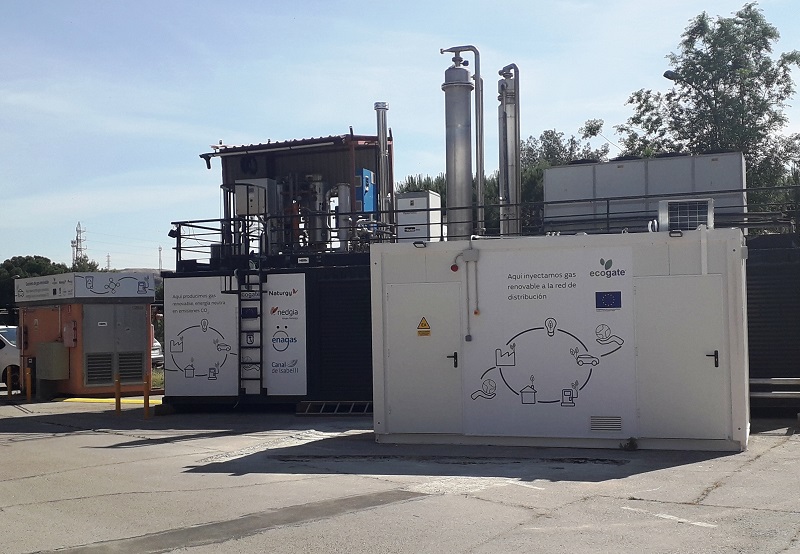The European ECO-GATE Consortium, co-financed by the European Union and led by NEDGIA, the gas distributor of the Naturgy group, has initiated test injection and distribution of the renewable gas generated at the Butarque wastewater treatment plant (WWTP) in the NEDGIA distribution network. Butarque’s renewable gas project has the collaboration of Enagás, Canal de Isabel II, Naturgy, the City Council and the Community of Madrid.
This is a milestone in the distribution of natural gas in Spain, since it will be the first time that renewable gas has been injected into the distribution network that will serve to develop the system of certificates of origin for renewable gas in Spain to advance in the compliance with the environmental decarbonization objectives proposed by Europe in 2030.
At the Butarque WWTP, which is managed by Canal de Isabel II, NEDGIA has installed a biomethane (renewable gas) production module that purifies the biogas recovered from the wastewater treatment plant (upgrading process) and another to inject the biomethane produced into its natural gas distribution network. In addition, powered by the NEDGIA distribution network at that point, the project also includes a compressed natural gas (CNG) refuelling pump for vehicles, managed by Naturgy. For it’s part, Enagás will analyze the gas quality of this experience of using biomethane for mobility.
According to David Fernández, director of the European ECO-GATE Consortium, “biomethane is the energy vector that contributes most to the circular economy and can solve the problem of storing intermittent production from other renewable energies,” adding that “it is necessary have the support of the government to develop the biomethane market with economic/financial support mechanisms and the promotion of certificates of origin for renewable gas that already exist in other countries.”
With the development of this innovative project at the WWTP in Butarque, the European ECO-GATE consortium has four objectives:
1) The production of biomethane from a biogas generated from waste recovery.
2) The injection of biomethane produced into the natural gas distribution network owned by NEDGIA, for distribution to the point of final consumption.
3) Market development of certificates of origin of renewable gas in Spain.
4) Demonstration of efficient and ecological use of renewable gas in land mobility applications.
Same applications as natural gas
Biomethane, as a renewable gas, is a CO2 emissions-neutral fuel generated through the degradation processes of organic matter. In this way, urban, agricultural, livestock and forest waste, wastewater, etc. are treated and transformed into a green gas, an energy that is completely interchangeable with natural gas, so it can be distributed through the most of 87,000 kilometres of the gas infrastructure that exists in Spain and used with the same energy applications in homes, industries, and shops, as well as for fuel in the transport sector. This does not require investments (neither public nor private) to be made to transform network infrastructures or user consumption equipment.
About the ECO-GATE Consortium
The European ECO-GATE Consortium (European COrridors for natural GAs Transport Efficiency) is one of the most ambitious global plans for mobility with conventional and renewable natural gas. Co-financed by the European Union Connecting Europe Facility, it is managed and coordinated by NEDGIA, as a consortium leader, and is made up of 38 partners from Spain, Portugal, France and Germany.
ECO-GATE uses new technologies and applies innovative solutions to enable the rapid and massive deployment of this alternative fuel, thanks to a significant reduction in the unit cost and a better understanding and greater knowledge of the needs of customers.
The project includes the construction of 21 natural gas refuelling stations along the Atlantic and Mediterranean Corridors in Germany (1), France (1), Portugal (6) and Spain (13). To this end, the funding provided to ECO-GATE will be shared among the four countries and will allow the development of gas stations in Barcelona, Cordoba, Cartagena, Irun, La Junquera, Madrid, Salamanca, Tordesillas, Aveiro, Lisbon, Setúbal, Tours and Heddesheim, among other cities. In addition, it also contemplates the realisation of another pilot project for the supply of renewable gas and hydrogen.
The participating natural gas operators are: NEDGIA Madrid, Enagás Transporte, Dourogás Natural, Endesa Energía, Galp Energía, Repsol, Naturgy Europe, Inversora Melofe, and Molgas Energía. The technologies and services providers include: Cetil Dispensing Technology, Soltel It Solutions, Cidaut Foundation, Evarm Innovation, Universidade de Tras-Os-Montes e Alto Douro, Imdea Energía Foundation, Audigna, Ghenova Ingeniería, and Madisa. While the final users are: Correos and San José López. And finally, the experts in market knowledge and promotion include: Gasnam, Port Authority of Gijón, Port Authority of Huelva, University of Santiago de Compostela, and Soulman Insightful Thinking.
The financing of the European Union responds to the fact that the project works in line with the European Directive 94/2014 promoting the development of the natural gas market for mobility purposes (ECO-G), as an alternative fuel. In addition, it has the support and interest of the Spanish Ministry of Industry and the Direção Geral de Energía e Geologia de Portugal, as well as the Spanish Gas Association (SEDIGAS) and the European Natural & Bio Gas Vehicle Association (NGVA Europe).
More information at http://eco-gate.eu/
